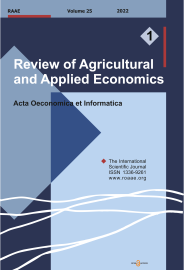KEYWORDS:
Irish potato; farmers; technical efficiency; returns to scale; SFA
DOI NUMBER:
10.15414/raae.2021.24.02.112-120
ABSTRACT:
Research background: Irish-potato (Solanum tuberosum L.) is one of the main root crops in Nigeria with the potential to improve food security, income and human nutrition. However, farmers are losing outputs due to inefficiency in resource use, whereas, past studies on Irish potato in Nigeria have not focussed on efficiency of the enterprise.Purpose of the article: This study is aimed at measuring technical efficiency to provide a way of quantifying and comparing the performance of each farmer, and identification of factors responsible for variation in technical efficiency. Hence, technical efficiency, and its determinants and returns to scale of Irish-potato farmers were analysed
Methods: Primary data was collected from 260 Irish potato farmers using a structured questionnaire through a multi-stage sampling method. Descriptive statistics (frequency, mean, standard deviation and percentages) and a two-stage estimation procedure to fit the stochastic frontier production function for Irish potato farmers were used.
Findings & value added: Results indicated that the farmers have a mean age of 48 years which indicates an agile workforce. Over 80% of the farmers possessed some form of formal education, predominantly at the secondary level. The efficiency estimates indicated a disparity in technical efficiency among farmers with a mean technical efficiency of 89±4%. The farmers were producing at decreasing returns to scale. At the same time, socio-economic factors of gender, extension contact, membership in cooperative society and farming experience were positive determinants of farmers’ technical efficiency, while household size was negative. Thus, being a male farmer, farming experience, encouraging contact between farmers and extension workers as well as membership in cooperative societies, while reducing household size can improve technical efficiency in Irish potato production.
Please Cite this Article as:
Dominic Midawa GULAK, Ogheneruemu OBI-EGBEDI (2021) Technical Efficiency Of Irish Potato Production: A Case Study From Nigeria. Review of Agricultural and Applied Economics. XXIV (Number 2, 2021): 112-120. doi: 10.15414/raae.2021.24.02.112-120
URL for sharing:
https://roaae.org/1336-9261/doi/abs/10.15414/raae.2021.24.02.112-120
FULL TEXT PDF:
▼ direct download link| view online in fullscreen ▲
References:
▼ direct download link

